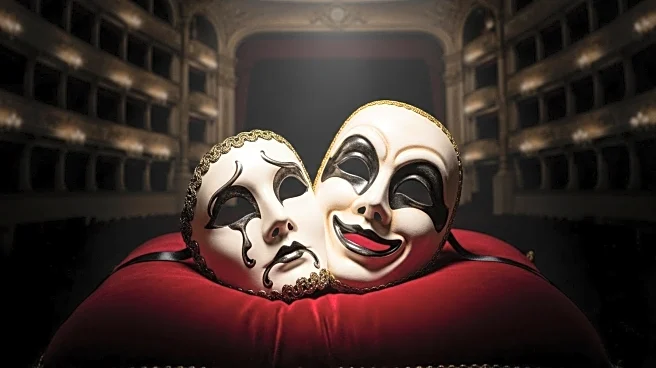What's Happening?
The L.A. Opera has commenced its 40th anniversary season with a production of 'West Side Story' at the Dorothy Chandler Pavilion. This choice reflects the opera's commitment to exploring new interpretations of classic works. The production, originally directed and choreographed by Jerome Robbins, faced challenges in adapting to the opera stage's larger scale. The choreography, led by Joshua Bergasse, was noted for its intricacy but struggled to maintain impact due to the expansive stage and lighting choices. The set design was formidable, featuring large structures that sometimes overshadowed the performers. Vocal performances by Gabriella Reyes as Maria and Duke Kim as Tony were highlighted, though sound discrepancies affected the overall experience. The production aimed to address themes of racism and misogyny, relevant in today's political climate, but faced criticism for not fully capturing the intended emotional impact.
Why It's Important?
This production of 'West Side Story' is significant as it attempts to address contemporary issues of racism and misogyny through a classic narrative. The choice to stage this musical in the current political climate underscores the ongoing relevance of these themes. However, the execution faced challenges, particularly in adapting the intimate nature of the original Broadway production to a larger opera stage. The discrepancies in sound and lighting highlight the complexities of translating musical theater to opera, impacting audience engagement. The production's attempt to provoke thought about societal change through art is crucial, yet the mixed reception suggests a need for more careful consideration in staging such works.
What's Next?
The production will continue to run through October 12, 2025, at the Music Center's Dorothy Chandler Pavilion. As the season progresses, the L.A. Opera may consider adjustments to address the feedback received regarding staging and sound issues. The broader implications of this production may prompt discussions within the opera community about how best to adapt musical theater works for opera stages, potentially influencing future programming decisions. Additionally, the themes of racism and misogyny explored in the production may resonate with audiences, encouraging further dialogue on these issues.
Beyond the Headlines
The staging of 'West Side Story' at the L.A. Opera highlights the ethical and cultural dimensions of presenting works with deep social themes in today's context. The production's attempt to address racism and misogyny through art reflects a broader cultural effort to confront these issues. However, the challenges faced in execution suggest a need for more nuanced approaches in adapting such narratives for different performance spaces. This may lead to long-term shifts in how opera companies approach the integration of musical theater works, balancing artistic integrity with audience impact.










